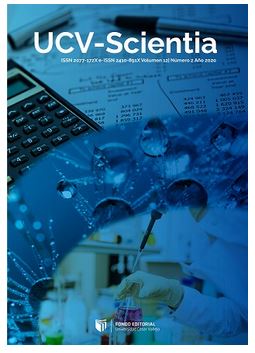Administrative, psychological and cultural determinants in the attitude towards the test cytological of uterine neck in women of Trujillo
DOI:
https://doi.org/10.18050/revucv-scientia.v2i2.878Keywords:
Uterine neck, Determinants of the Papanicolaou, Test cytologicalAbstract
With the purpose of identifying the administrative, psychological and cultural determinants in the attitude towards the test cytological of uterine neck, interviewed 280 women in fertile age residents in the Province of Trujillo, were interviewed of randomly selected; of then 25 women came from Víctor Larco, Florencia de Mora, El Porvenir, La Esperanza, Moche, Salaverry, Simbal, Laredo, Huanchaco, Poroto and 30 women of the district of Trujillo during July to October 2008. Each women had to answer an instrument destined to inquiered if the women had be or not realized the examination of the Papanicolaou during the course of her life, as well as the possible determinants of this procedure. For the statistical analysis there was in use the test of square Chi and Z for averages, fixing the level of significance in P <0.05. It was found that the frequency of denial towards the test cytological of uterine neck was of 15.4%. The type of relations supplier and user inadequate, the fear of the accomplishment of the test the opposition examination of the pair and under level of knowledge on the cancer of uterine neck and its despistaje are determinant administrative, psychological and cultural of the attitude towards the test cytological of uterine neck. (P<0.05).
Downloads
Published
How to Cite
Issue
Section
License
Copyright (c) 2010 UCV - Scientia

This work is licensed under a Creative Commons Attribution-NonCommercial 4.0 International License.
- Share — copy and redistribute the material in any medium or format
- Adapt — remix, transform, and build upon the material.
- The licensor cannot revoke these freedoms as long as you follow the license terms.
Under the following terms:
-
Attribution — You must give appropriate credit, provide a link to the license, and indicate if changes were made. You may do so in any reasonable manner, but not in any way that suggests the licensor endorses you or your use.
- No additional restrictions — You may not apply legal terms or technological measures that legally restrict others from doing anything the license permits.













